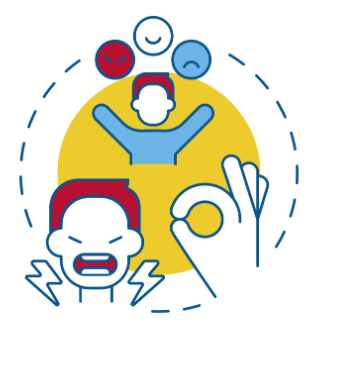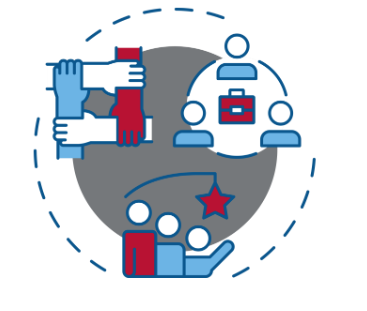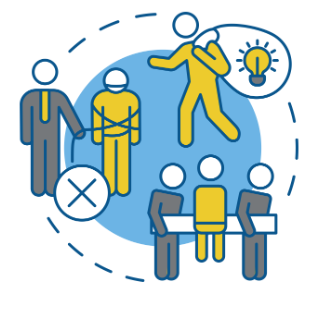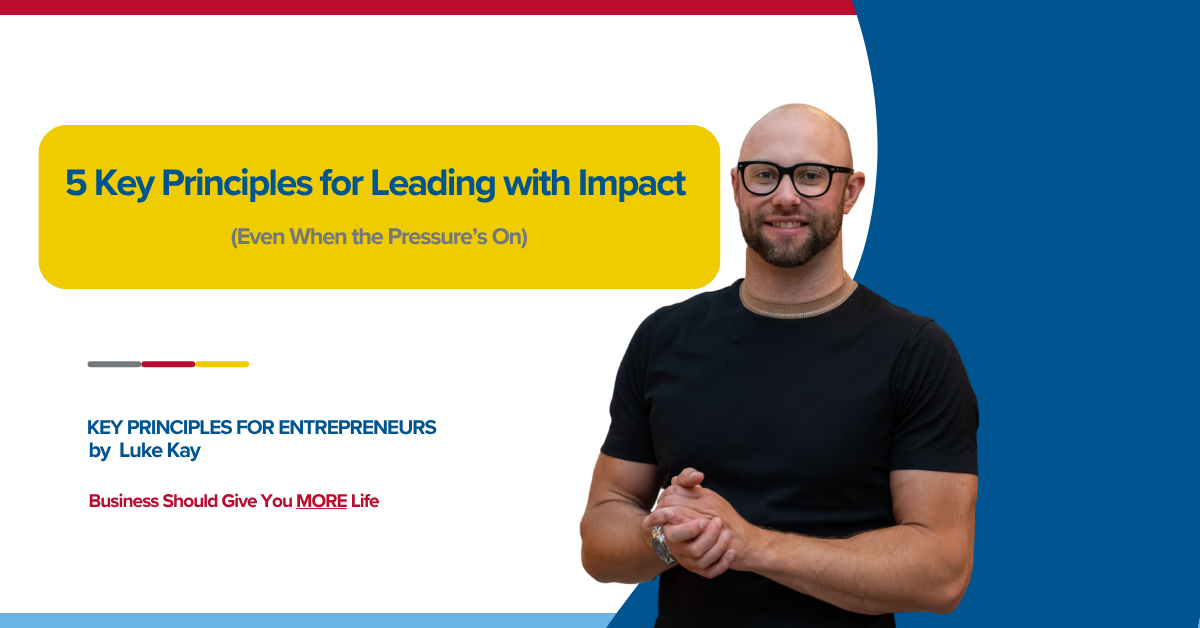Leadership isn’t about always having the answers.
It’s about how you show up when things don’t go to plan, when people are uncertain, when pressure’s high, and when your team looks to you for stability.
True leadership isn’t measured by how loud you can shout orders. It’s about keeping calm when everyone else starts to wobble, having the emotional intelligence to connect with people, and the discipline to stay focused when the noise around you gets too much.
These five principles show what it really takes to lead when it matters most.
Key Principle #1: Emotional Control Is a Superpower
When everything’s going wrong, people don’t follow the loudest person in the room, they follow the calmest. Emotional control is one of the most underrated leadership skills there is. It doesn’t mean pretending not to feel stressed; it means managing your emotions so they don’t manage you.
Key Principle #1 Case Study: Hotel Football
When the pandemic hit, Gary Neville, co-owner of Hotel Football in Manchester, was faced with an impossible situation. Bookings evaporated overnight, staff were anxious, and the hospitality sector was in free-fall. But instead of reacting in fear, he took decisive, composed action, he opened the hotel’s doors to NHS staff, rent-free. That single act of clarity and composure under pressure earned huge respect from both his team and the public.
He didn’t just save face; he strengthened culture. His people saw how a leader’s state directly shapes a company’s spirit. Emotional control isn’t about detachment, it’s about stability. And in business, stability creates trust.
Key Principle #2. Pressure Reveals the Real You
Adversity doesn’t build character — it reveals it. When things go wrong, your team watches not just what you say, but how you react. The tone you set in those moments determines whether panic spreads or performance kicks in.
Key Principle #2 Case Study: Social Chain
When Steven Bartlett, founder of Social Chain, took his company public, he faced intense scrutiny and rapid change. Mistakes were made, systems broke down, and the pressure to perform was relentless. But instead of deflecting blame, he spoke openly about the challenges. That honesty didn’t weaken him, it deepened loyalty. His transparency turned pressure into an opportunity to grow and evolve as a leader.
The truth is, pressure isn’t the enemy. It’s the mirror. It shows you who you are when the comfort zone disappears. Great leaders don’t hide from it, they use it to build self-awareness, grit, and credibility.
Key Principle #3. Listening Builds Trust Faster Than Talking
Leadership isn’t about having the best speech; it’s about having the best ears. When people feel heard, they stop resisting and start engaging. Listening is one of the fastest ways to build trust, defuse tension, and make people feel valued.
Key Principle #3 Case Study: BrewDog
A great example comes from BrewDog, where staff unrest made headlines. Instead of shutting conversations down, the local management began hosting open forums, real, unfiltered listening sessions. It wasn’t about defending decisions or managing perception. It was about understanding what wasn’t working. That shift turned confrontation into collaboration and helped rebuild trust within the team.
The lesson is simple: you can’t lead people you don’t understand. Listening isn’t a soft skill, it’s a leadership superpower. When your team feels genuinely heard, they’ll go further for you, even when things get hard.
Key Principle #4. Focus on Habits, Not Hype
Motivation can get you started, but it’s habits that keep you going. Under pressure, hype fades. What saves you are the routines, rituals, and daily disciplines that keep you grounded and consistent.
Key Principle #4 Case Study: The Baltic Bakehouse
Known for its artisan bread and loyal community following, it faced huge uncertainty during the pandemic. While other bakeries tried to chase trends or pivot into new ventures, they focused on what they did best, baking every morning without fail, serving their regulars, and communicating clearly online. That steady rhythm created reliability when everything else felt unpredictable.
As the noise settled, their focus on consistency paid off. Sales climbed again, community loyalty grew, and the business came out stronger. Great leadership isn’t about hype or quick wins, it’s about structure and small wins that compound over time.
Key Principle #5. Lead the Person, Not Just the Performer
You can’t expect peak performance from people who feel unseen or burnt out. The best leaders know that business is human. People bring their whole selves to work — their hopes, fears, and everything in between.
Key Principle #5 Case Study: JD Sports
With their headquarters in Bury, they learned this lesson during the intense scrutiny of the pandemic. Under fire for working conditions and morale, the business began shifting its internal focus. Local management started holding wellbeing check-ins and encouraging more open communication, moving away from purely performance-based reviews. It was a cultural pivot that acknowledged the person behind the numbers, and it paid off in engagement and retention.
When you focus on the human being first, performance follows naturally.
Leadership isn’t just about KPIs and outcomes; it’s about creating the space where people can thrive.
Implementation Strategy
It’s one thing to read about leadership under pressure, it’s another to live it.
The truth is, these five principles aren’t theory; they’re daily practices that you can build into how you lead, think, and respond.
Here’s a simple way to put them into action:
- Start each day with state control: Before you check your inbox or walk into a meeting, take 60 seconds to centre yourself. Slow breathing, shoulders back, clear head. How you enter a situation is how your team will follow.
- Use pressure as your feedback loop: The next time things go wrong, instead of reacting, pause and ask, “What’s this teaching me about how I lead?” Every stressful moment is data — use it to grow, not to spiral.
- Listen before you decide: In every meeting, make it a rule to listen twice as much as you talk. Your team already has the answers to most of your problems — your job is to help them voice them.
- Build consistency rituals: Create simple, repeatable habits — daily huddles, weekly planning, or Friday reflections. Habits are your anchor when things feel unstable.
- Check in on people, not just performance. Ask “How are you doing?” as often as “How’s the target?” You’ll learn more about what drives your business by understanding what drives your people.
These aren’t just leadership hacks, they’re tools for life.
When you lead with calm confidence, people feel it. It builds safety, clarity and respect — the three things every team needs to perform under pressure.
Take Action
Leadership isn’t about control, it’s about connection.
It’s about steady hands, clear minds, and a focus on the human side of business. When you master these principles, you don’t just build a stronger team — you build a more sustainable version of yourself as a leader.
If you’re ready to lead with more calm, clarity and confidence, book a Clarity Call with me today.
Let’s create the mindset and systems that help you perform under pressure — and bring your team with you.
Our Events
Join one of our monthly Business Growth Events in Liverpool. Whether you want quick wins at a half-day MasterCLASS or the full day 90-Day Planning workshop, these are practical, interactive sessions that are a part of our Entrepreneurship Academy and 1-2-1 Business Coaching programmes, and it’s where local business owners come together to learn, plan, and take action.
Backed by more than 30 years of ActionCOACH’s proven frameworks and strategies, they’re focused, no-fluff client events, designed to give you clarity, confidence, and a clear path forward.
Book your seat at the next session and spend some time working on your business, not just in it.






